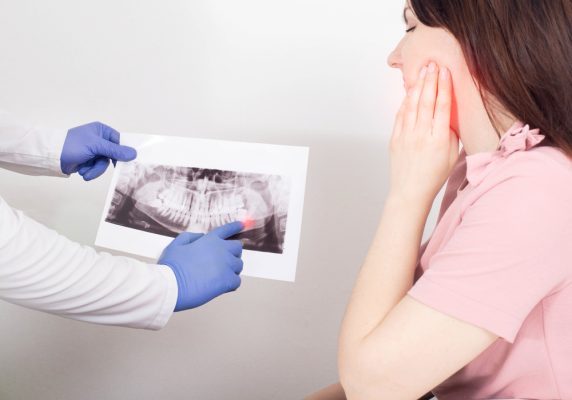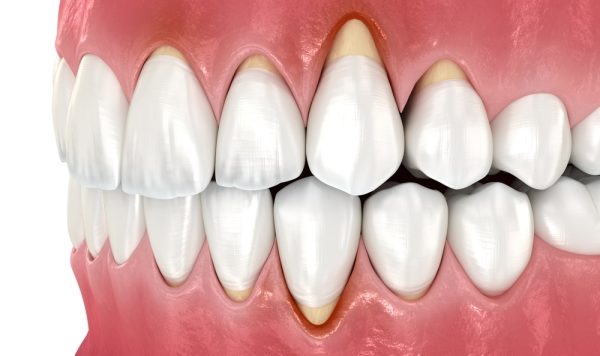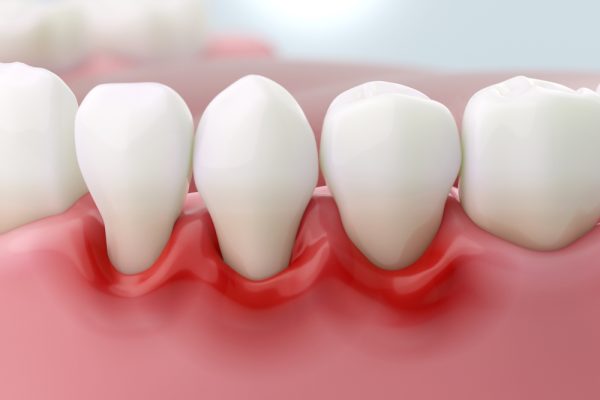Protecting Your Smile: Early Intervention for Gum Disease
Periodontal disease is a complex, progressive condition that can significantly compromise oral health and potentially lead to systemic complications when left unaddressed. This condition evolves through distinct stages, beginning with mild inflammation and potentially advancing to more severe tissue and bone destruction.
Understanding the nuanced progression of periodontal disease is crucial for early detection and effective intervention. To schedule a comprehensive evaluation, schedule an appointment with San Clemente periodontist, Dr. Raymond L. Wright Jr. Call Wright Perio & Implants, your local South Orange County dental practice today by calling (949) 361-4867.
What is Periodontal Disease?
Periodontal disease, or gum disease, is a chronic infection that targets the gums and the bone that supports your teeth. Gum disease starts with plaque buildup on the teeth and along the gum line, which leads to inflammation and infection.
If untreated, this infection can extend to the bone and tissue surrounding the teeth, causing significant damage and even tooth loss. Understanding the nature of periodontal disease is crucial for maintaining oral health and preventing its progression.
Stages of Periodontal Disease
Gingivitis
Gingivitis, the initial stage of gum disease, represents a mild inflammatory response primarily triggered by bacterial plaque accumulation around dental structures. Characteristic symptoms associated with this stage of gum disease include:
- Bleeding Gums: Gums may bleed easily during brushing or flossing.
- Swollen or Tender Gum Tissue: The gums appear puffy and may feel sore to the touch.
- Persistent Bad Breath: Halitosis can be caused by bacteria buildup in the mouth.
- Subtle Gum Recession: A slight pulling away of the gums from the teeth may be noticeable.
- Increased Gum Sensitivity: Gums may feel more sensitive to temperature changes or touch.
- Texture Changes in Gum Tissue: Gums may feel softer or spongier than usual.
Fortunately, gingivitis remains the most treatable stage of periodontal disease. With meticulous oral hygiene practices, including consistent brushing, daily flossing, and professional dental cleanings, this condition can often be completely reversed.
Dr. Wright emphasizes the importance of early intervention. If you observe any initial signs of gingivitis, scheduling a prompt consultation can prevent progression to more serious stages of gum disease.
Early Periodontitis
When gingivitis remains untreated, the condition can advance to early periodontitis, characterized by more invasive bacterial penetration into deeper gum tissues and surrounding bone structures.
Key indicators of early periodontitis include:
- Persistent Halitosis: Bad breath becomes more noticeable and resistant to regular oral hygiene.
- Consistent Gum Bleeding: Bleeding occurs more frequently during brushing and flossing.
- Increased Gum Redness and Swelling: Inflammation becomes more pronounced and widespread.
- Noticeable Gum Recession: Gums recede further, exposing more of the tooth root.
- Heightened Tooth Sensitivity: Teeth become more sensitive to hot, cold, and sweet stimuli.
- Initial Tooth Mobility: Teeth may begin to feel slightly loose or movable.
- Development of Periodontal Pockets: Spaces form between the gums and teeth, allowing for further bacterial invasion.
At this stage of gum disease, bacterial infiltration begins causing irreversible damage to supporting bone structures. Treatment for this stage of gum disease typically involves thorough scaling and root planing procedures to remove deeply embedded plaque and tartar.
Moderate Periodontitis
The third stage of gum disease, moderate periodontitis demonstrates significant bone loss and extensive gum recession. Symptoms of moderate periodontitis escalate to include:
- Pronounced Gum Pocket Formation: With moderate periodontitis, deeper pockets develop between teeth and gums, harboring more bacteria.
- Persistent Gum Inflammation: Gums remain consistently red, swollen, and tender.
- Visible Tooth Migration or Shifting: Teeth may noticeably change position due to bone loss.
- Potential Gum Abscesses: Pus-filled swellings may form in the gum tissue.
- Chronic Bad Breath: Halitosis becomes more severe and resistant to treatment.
- Alterations in Bite Alignment: Changes in tooth position can affect how upper and lower teeth meet.
- Discomfort During Mastication: Chewing may become painful due to tooth mobility and gum inflammation.
During this phase of gum disease, treatment becomes more complex, potentially involving a multifaceted approach including scaling and root planing, targeted antibiotic therapies, and potentially surgical interventions like bone grafting or guided soft tissue and regeneration.
Advanced Periodontitis
Advanced periodontitis, the most critical stage of periodontal disease, represents a severe inflammatory condition involving substantial bone destruction and significant tooth instability.
Symptoms at this stage of gum disease include:
- Intense Oral Pain: Severe discomfort may be experienced throughout the mouth.
- Potential Tooth Loss: Teeth may become extremely loose or fall out due to a lack of supporting structures.
- Extensive Gum Inflammation: During the advanced stage of gum disease, the gums appear severely red, swollen, and may bleed easily.
- Severe Tissue Recession: Significant portions of tooth roots become exposed due to gum recession.
- Painful Abscesses With Potential Pus Discharge: Multiple abscesses may form in this stage of gum disease, causing severe pain and discomfort.
- Persistent Gum Bleeding: During this stage of gum disease, bleeding may occur spontaneously or with minimal provocation.
With advanced periodontal disease, aggressive treatment is necessary to save the remaining teeth and restore oral health. Surgical interventions, extensive periodontal therapy, and potential tooth replacement options may be required.
Frequently Asked Questions
Gum disease’s curability depends significantly on its stage of progression. While advanced stages cannot be completely reversed, they can be effectively managed and controlled through comprehensive professional treatment and rigorous personal oral hygiene practices.
Early-stage gingivitis offers the most promising opportunity for complete resolution, making early detection and intervention critical in preventing long-term oral health complications.
The transition from reversible to irreversible gum disease occurs during the second and third stages of periodontitis. Dr. Wright recommends maintaining meticulous oral hygiene, including regular brushing, flossing, and scheduled professional dental examinations.
By implementing these preventative strategies and seeking timely professional assessment, patients can significantly reduce their risk of developing progressive, irreversible periodontal conditions.
Emerging medical research increasingly demonstrates a profound connection between oral health and systemic wellness. Periodontal disease bacteria can potentially enter the bloodstream, triggering inflammatory responses that may contribute to other serious health complications from conditions like cardiovascular disease, stroke, and diabetes. By prioritizing comprehensive oral care, patients can simultaneously protect both their dental and overall physiological health.
Periodontal disease advances through a relatively rapid progression. Bacterial plaque can reach peak accumulation within just four days, with visible gingivitis symptoms potentially emerging by day five.
Without intervention, the transition from initial inflammation to more advanced forms of gum disease can occur within weeks, underscoring the critical importance of consistently good oral hygiene and regular professional monitoring.
Are You at Risk for Gum Disease? Schedule a Consultation!
Serving patients throughout Orange County, including Irvine, Laguna Niguel, San Juan Capistrano, and Mission Viejo, Wright Perio & Implants offers comprehensive gum disease treatment and periodontal care. If you’re experiencing potential gum disease symptoms or wish to proactively protect your oral health, schedule an appointment with Dr. Wright today. Don’t allow periodontal complications to compromise your smile and overall wellness. Contact us at (949) 361-4867 to schedule your personalized consultation and take the first step toward optimal oral health.




